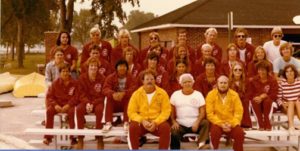Unveiling Leadership Wisdom: 40 Years, 20 Mentors, Countless Lessons

Over the years, I made notes on what I learned from people I reported to or provided some much-needed guidance. There were plenty of leaders, managers, and “supervisors” over the forty years some worth remembering, some not, but they all had made some contributions, good, bad, or indifferent. I came up with a summary list of people who had left enough of an impact which helped create an ever-evolving leadership style and capacity for growth. In chronological order, is a brief description of what I learned from fifteen highly effective leaders, three nice yet, ineffective supervisors, and two truly horrible, douchebag bosses. I no longer wonder how a couple of dimwit nincompoops got their jobs, but I keep them on the list for amusement purposes only.
A big heartfelt thank you to all of the highly effective leaders that I worked with. You all made a tremendous difference that has lasted a career cycle and a lifetime. Even more, as I passed some of your leadership practices and lessons to my direct reports over the years.
There’s a story behind each that might someday make it in a possible book in the future. Some readers might recognize the distinct names and unique and endearing characters and I request for the sake of discretion please consider that your comments are in the public domain.
It’s been an interesting exercise and highly recommend that you give it a try to discover a few of the origins of your your habits and patterns. Visit your list on occasion or when someone triggers a forgotten memory and write it down.
Lessons From the Masters In My Working Career
Dave T:
1. Invest the time to train, coach, and develop people.
2. Set standards and maintain them.
3. Integrity is all about what you are doing when no one is looking.
4. Never turn your back on the water while you are responsible for the people in it.
Drew R:
1. Tough, but fair. Set and maintain a standard of performance and behavior. Never waiver from the standard even it means your decisions will make you unpopular with a few people at the time.
2. Provided me with the first exposure to Inclusiveness and Emotional Intelligence, but way, way too young to recognize it.
Warren P:
1. Sample in duplicate. If there’s a data point that does not look right, check your math, investigate the trend, and repeat the experiment.
DH:
1. Never overreact to an employee who has observations that is opposed to your own view or perception.
EZ:
1. If you spend time collecting mountains of data, do something with it. If you don’t, you have wasted time, money, energy, and opportunity not turning it into information that someone could use to make a sale or increase customer satisfaction.
Dave H.
1. If you can accept the fact that you can be fired anytime for any reason then you’ll do just fine in sales.
2. Where are you Dave H? I never got to thank you!
Jim S:
1. Pre-Call Planning. Have a plan prepared on who you are going to see when you will be there and the reason why you are meeting with them.
2. How to sell door to door. (Yes, we used to do that in University research buildings).*
3. When you walk in the door, smile, and tell them who you are, what company you work for, and why you are there.
4. How to ask questions that are important to your customer and their work which will help identify their problem for you.
5. When you make a promise to a customer, deliver on the promise and in the promised time frame, if not earlier. (Follow Up and Follow Through).
6. Ask for the order and tell them what will happen after they place the order.
7. Discounting does not speed up the sales process.
8. How to coach, mentor, and team sell a new hire and know when it’s time they are ready to go solo.
John S:
1. Pick up the phone and make the appointment. Don’t rely on the customer being available when you show up.
2. If you ask for reports and the employee sends them in when requested, the manager is obligated to read these reports, make a comment or deliver on an action requested. If you’re not going to read them or even open them, do not request they spend time preparing them.
3. You must make the effort to bounce back after a career setback no matter what the circumstances. Be prepared to re-invent yourself.
Mike C:
1. If you don’t have a call plan, you are just visiting. Visiting does not create value or make a sale.
2. Relationship Selling. People buy products from people they trust.
3. Remove all the obstacles and roadblocks that get in the way of your team to allow more selling time with customers.
4. Change parts of the territory every 2 years so the rep has to find new prospects that they do not know.
5. Trust your people to do the right thing and they will always deliver more than you ask.
Mike W:
1. When discussing a problem with your boss, be sure to bring three solutions along to discuss.
Tom W:
1. Performance is always measured, know your numbers.
2. My first exposure to Behavioral Based interview questions.
Duncan L:
1. How to build an effective loyal team and provide them with crystal clear goals.
a. Pick the right people, put them on the right bus, in the right seats, and in the right direction.
2. Inclusiveness builds trust and loyalty.
3. Strong loyalty to a highly effective leader can become a threat to weak high-level “amateur” managers who think they can do a better job.
Burt D:
1. Create the environment for the team to take risks to create upside and get rewarded. The leader takes on any consequence if a shortfall occurs.
2. Have actionable items prepared and handed out before the meetings end.
Peter E:
1. The sales budget/quota should never, ever exceed production capacity.
2. People have enough capacity but never push beyond it without giving them the upside.
Peter C:
1. Always ask with frequency: “What have you sold today?”
2. The President of the company should never be running around the building looking for a power cord that belongs to a demo piece of equipment so it can be shipped to recognize revenue for the month.
Mike P:
1. Never stay in a job too long because you are too lazy to look for another job.
2. Don’t revisit bad experiences. Let go, move on.
Joel M:
1. Knew and appreciated what the term “King Maker” meant.
2. Weed the “Takers” out of the organization quickly.
Jeff I:
1. The person you are talking with at the moment is the most important person at that moment.
2. Sometimes you have to play injured.
3. Know your playbook and know your numbers.
4. Don’t over pay for a dreamy sales pitch. (Thank you anyway).
Horrible Bosses: Douche Bag #1 & 2:
1. The beatings will continue until morale improves.
2. Social media became an effective “cafe” to document an ugly story of gross incompetence which eventually led to change.
3. The HR department is not your friend. They exclusively represent the interests of the company.
a. HR is the first you see during the hiring process and the last you see when you leave.
4. If no one has your back, you’ve got to move your back
KS:
1. Missed deadlines are not suggestions to provide you opportunities for second chances.
2. If you’ve had only one job at a small, struggling company during your entire professional career, you’ve inherited good and bad habits from a small subset of people that may or may not transfer outside of that company culture without painful growth.
Uwe G:
1. Network, always network. You never know who or how a connection can help other people unless you make them yourself.
SS, FL:
1. Phony friendly exaggerates one’s insecurity.
2. Customer-facing people, are not responsible for shareholders or Wall Street analysts.
3. Condescending behavior makes one look like a bigger nincompoop.
4. Define what business strategy is before assigning it.
Steve T:
1. Pick the right people, put them on the right bus, in the right seats, and the right direction. Encourage people with the capacity to adjust the seats.
2. Trust in the team to deliver the goals that were discussed. (see previous trait)
3. Step in at the right time to modify behavior and allow it to gel for an even better result next quarter.
